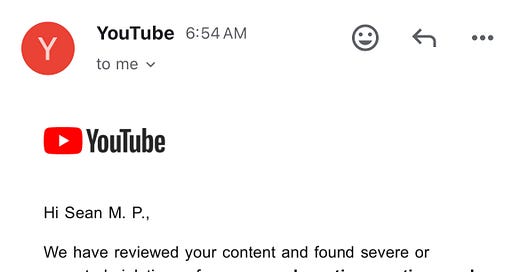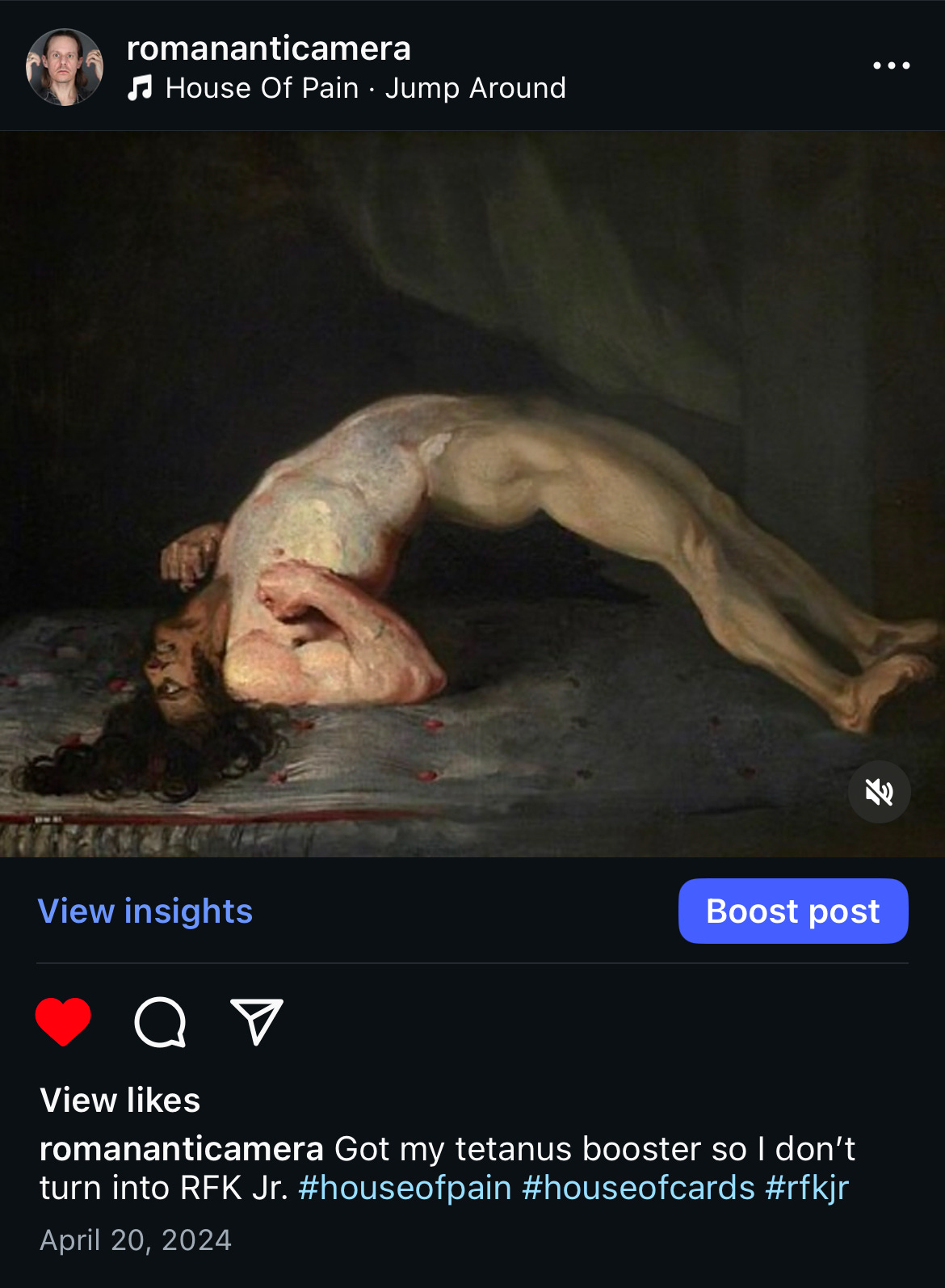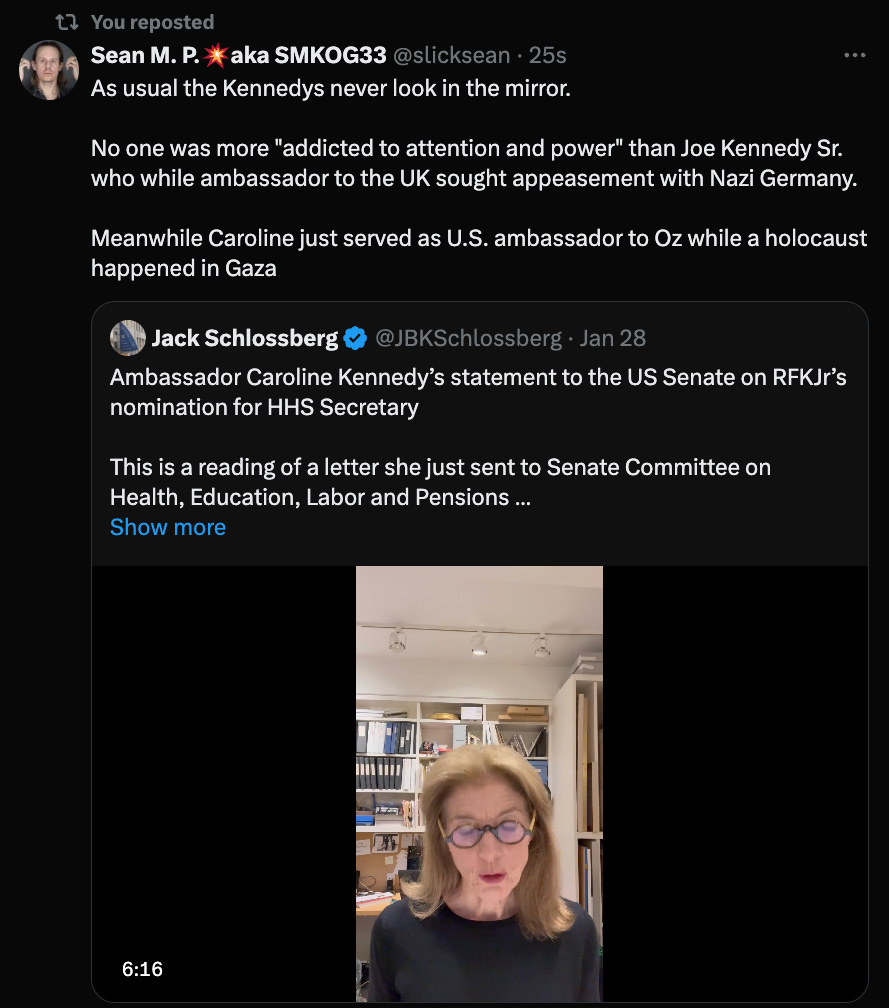Supplementing the Record III
What was left out? For another thing, the truth about the 1960s and its legacies
Greetings, core readers of The Book of Sean M. P., and welcome to all people making cameos. This is your host with the mostest, Sean M. P., inviting you to another Paralipomena, the explicitly politico-intellectual adjunct to the OG B.O.S.M.P.
I was all set to open this latest scroll with the item buried beneath this one—on the dramatic spike in Dead Kennedys news this week—when I woke on Friday to a dramatic spike in my own personal Kennedy news: my YouTube channel terminated under false pretenses (see screenshot above).
As regular readers of this experiment in self-publishing know, I’m the subject of constant pranks out here in La La Land—pranks being what my uncle from another mother George Clooney has said is the cost of celebrity status. (I paraphrase because I can’t find the original remark.)
So while I wondered at first if Trump had asked Sundar Pichai to shut me down given how cozy Big Tech is with Forty Five-cum-Forty Seven ahora, eventually I remembered the sight the day before of the title on one of my students’ picture books: Sisters—the name of the NBC evening soap opera on which Clooney appeared in the early ’90s.
Not incidentally, an “opera” is what Jacques Audiard is calling the colossal fail of Emilia Pérez in spite of its thirteen Oscar nominations.
Maybe he meant “telenovela” but it’s clear he lacks the cultural competency to understand the themes he sought to portray, as does his lead actress.
Indeed, as I dawdled in dotting all the eyes and crossing all the teas on this undead letter, Karla Sofía Gascón went on a tear on CNN en Español.
Dead Kennedys
I took a class while an undergrad at UVA on the 1960s. An English class that also doubled as that semester’s offering for the now-extinct Modern Studies concentration within the English major.
I remember our teacher, Prof. Michael Levenson—whom we didn’t call “professor” by institutional tradition but “mister”—going around the room on the first day of the course to hear why we thought the decade of the ’60s was still important to contemporaneity.
The Gregorian time was the mid-’90s and I had significant ties to the hippie and rave scenes at school, both communities that upheld the values of peace, love, unity, and respect. My answer in class was obvious: the spirit of the Sixties was alive and well today even as the issues the social, political, and economic movements brought to crisis remain unresolved.
I’d been meaning to write about this formative moment—it was the first time I consciously realized how enduring that decade’s influence was, and now I study the backlash to that influence—and then this week Caroline Kennedy made it all about her family once again, providing even more attention to a man she accused of being “addicted to attention and power,” RFK Jr.
In so doing—and by directly referencing her late daddy in the process—“Caro” brought me right back to that pivotal early ’60s transition from the 1950s in all its chaos.
And she demonstrated that those of us looking to move past the 20th century—and the Cold War, and the Pax Americana that never was—are going to have to wait for every last Baby Boomer to be carried out of the political arena.
Here I remind that Trump is currently the same age Biden was when he entered the White House in 2021—which means we’ve effectively fallen back four years in Washington time.
Unfortunately Caroline Kennedy is only 67 and is clearly interested in a larger role politically in this country, given her unprecedented scorched-earth tactic against her own vaunted father’s brother’s son. And her son Jack Schlossberg, who palled around with Pal Joey this summer while Gaza was leveled, has inherited his mother’s willful ignorance.
As I said in the video I’d posted at the top of this vertical before my YouTube channel was unceremoniously killed:
Human beings evolved to be the apex predators of the planet because of the best information. So somebody needs to tell Caroline Kennedy that she doesn’t have the best information. She needs to Google the Cuban Missile Crisis, Bay of Pigs, Marilyn Monroe. Because her daddy ain’t the saint she thinks he is.
I wish I’d learned the truth of JFK much earlier in my life.
As it happened, it took me until just last summer—2024—to realize the scene staged for me at my dissertation defense five years ago this February 13th.
I hadn’t understood why Arthur had slouched in the farthest seat at the conference table in the English-department seminar room that day. Robert Reid-Pharr, beaming in from Cambridge on the video screen, had inquired as to my guest and when I turned my head, I saw Arthur wasn’t beside me as he’d been originally but several positions away looking totally uncomfortable.
I never asked him about it but the image appeared in my head from time to time afterward. And then, when I was reading about the Bay of Pigs one day this summer, I came across the following description of a White House decision-making meeting for that failed military endeavor.

25 Key Dates
A timeline that’ll come in handy as I work through the transitional decade of the 1960s, which the tumultuous decade of the 2010s resembles in the historical re-reading I’m doing for my work-in-progress Química Divina:
Civil Rights Act of 1957 signed by Eisenhower, September 9th
Castro arrives in Havana, January 9th, 1959
Civil Rights Act of 1960 signed by Eisenhower, May 6th
JFK elected president, November 8th, 1960
Bay of Pigs Invasion, April 17th–20th, 1961
Strategic Hamlet Program approved by JFK, February 2nd, 1962
Cuban Missile Crisis, October 16th–28th, 1962
Medgar Evers assassinated, June 12th, 1963
March on Washington for Jobs and Freedom, August 28th, 1963
JFK assassinated, November 22nd, 1963
Twenty-Fourth Amendment ratified, January 23rd, 1964
Civil Rights Act of 1964 signed by LBJ, July 2nd
Malcolm X assassinated, February 21st, 1965
U.S. ground war in Vietnam begins, March 8th, 1965
Voting Rights Act of 1965 signed by LBJ, August 6th
Summer of Love, January 14th–October 17th, 1967
Six-Day War, June 5th–10th, 1967
Loving v. Virginia, June 12th, 1967
MLK assassinated, April 4th, 1968
Civil Rights Act of 1968, April 11th, 1968
Poor People’s Campaign, May 12th–June 24th, 1968
RFK assassinated, June 5th, 1968
Nixon elected president, November 5th, 1968
Paris Peace Accords signed, January 27th, 1973
Nixon resigns, August 9th, 1974
Spring Fling
Last year heading into the spring Abrahamic season I read Martin Buber’s I and Thou and this year I’m going to reprise that practice and make it a tradition.
Published in English in 1937, the work is a short, accessible philosophical text on the irreducible ethical necessity of reciprocity. I’ll be engaging with it in a few Paralipomena numbers beginning the week of Purim (March 13th–14th) and concluding in the days before Passover (April 12th–20th), so if you’d like to follow along, get cracking on the reading linked here again.
It has three parts, so I’ll dedicate part of three different scrolls to it. And depending on interest—and paid-subscriber growth—maybe I’ll host my first informal “office hours” to accompany the collective reading.
Ciao for Now
Alessandro Michele’s debut haute couture show for Valentino was totally genius, capturing exactly what I think of as quantum spacetime. (Skip the cloying prelude, a bit of a bait-and-switch for the real thing.)
And his remarks about the show in a companion video for Vogue really hit the nail on the head.
I don’t like time in general. I think that doesn’t make sense to, you know, put boundaries in the idea of ages. And I was trying to investigate that kind of relation between body dress, different faces, and yes, probably for most of the people, different ages, but doesn’t really exist different ages. Exists different lives, different way[s] to live, different experience[s]. I like people, so I don’t wanna make like boundaries between human beings.
(More details on the show’s inspiration—sans paywall—at W.)
I don’t like time in general either.
That’s because—as Alessandro co-signs—there’s just quantum spacetime.
Ciao for now,
Sean M. P.











